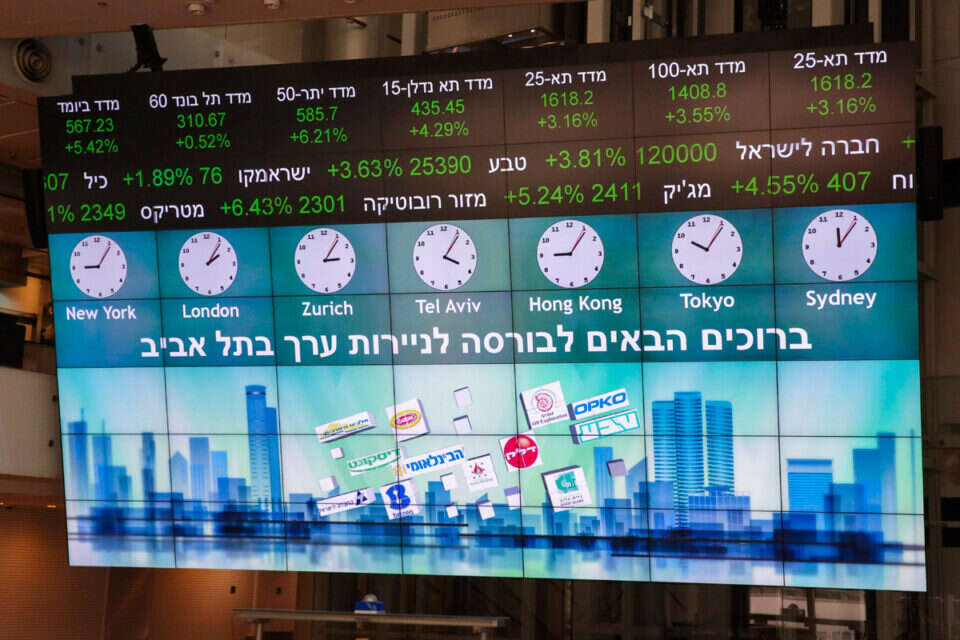Due to the escalation in the security situation, the leading indices on the Tel Aviv Stock Exchange are trading with sharp declines. The Tel Aviv 35 Index and the Tel Aviv 125 Index declined by about 1.7 percent each. The dollar jumps more than one percent and is now trading around $3.71. However, even today's declines will not succeed in erasing the significant increase recorded on the Israeli stock exchange in November.
A scenario of limited war. Bank of Israel, Photo: Oren Ben Hakon
In total, the flagship indices in Tel Aviv increased impressively: the Tel Aviv 35 Index by 8%, the Tel Aviv 90 Index by about 10%. This is similar to the US markets, which recorded price increases of 8-11 percent, and thus it can be said cautiously that the correlation that characterized the domestic market with the US market is beginning to return.
Noam Meirovitch, senior investment manager at Migdal Capital Markets, explains: "The stock exchanges' performance in November is a mirror image of the direction recorded in October, when, especially in Israel, the market reacted strongly to events downward."
Stock Exchange. In the monthly summary - an impressive increase in the Tel Aviv indices (archive), photo: Yossi Zeliger
In a monthly summary, Meyerowitz notes, "Bank stocks that were battered prior to this stood out, among other things, and this is significant because banks are one of the preferred industries for investment by foreign investors. We also saw solid gains in stocks in the income-producing real estate sector. It seems that in recent times consumers and investors have been somewhat encouraging, after activity in shopping centers was significantly damaged last month, both by their closure some of the time and by a reduction in consumption that was affected by the mood of consumers."
Referring to what is happening in the foreign exchange market, Meyerowitz notes that the recent sharp weakening of the dollar against the shekel "was backed up by a negative movement of the dollar around the world, against the background of declining yields in the US and investors' sense that the US economy is facing a scenario of waning inflation. In Israel, the weakening of the dollar stood out in its strength, also as a mirror image of the strength of its strengthening against the shekel."
Looking at December, Meyerowitz notes: "Trading at the end of the year is usually characterized by a positive trend in the markets. At the same time, we can see a decline in the intensity of the increases, and it seems that the markets are stabilizing at their current level, so that overall in December there is room for caution. After the significant move that the markets presented in November in the US as well, and especially in Israel, here the uncertainty is still great in view of the war."
The Trigger – Security Events
Ronen Menachem, Chief Market Economist at Mizrahi Tefahot, explains the declines on the Tel Aviv Stock Exchange today: "Today's price declines on TASE follow sharp, double-digit increases recorded in the market in previous days. These increases almost completely offset the sharp declines at the beginning of the war. The trigger for all this – the security incidents that took place today, including (almost) a return of fighting (only a few minutes before seven o'clock it was decided to postpone the move), the deadly attack in Jerusalem in the morning, the sirens in the north and the attempted vehicular attack in the afternoon."
Any security escalation will be translated into a depreciation of the shekel. Ronen Menachem, Photo: Mizrahi Tefahot
According to Menachem, "These events are integrated into the media discourse about the warming of the Judea and Samaria sector. Any escalation or discourse that may signal the expansion of the military campaign to additional sectors will exacerbate the tension and nervousness in the local stock market, especially after the recent increases.
"This is because, so far, all experts, including the Bank of Israel and the chief economist, have assumed a scenario of a war limited to the south and a few months. From this, the costs to the economy are derived, and these are ultimately reflected in companies traded on the stock exchange. In addition, the end of the pause and the renewed security escalation will be translated into a renewed depreciation of the shekel and will make it difficult for the Bank of Israel to lower the interest rate."
Wrong? We'll fix it! If you find a mistake in the article, please share with us

